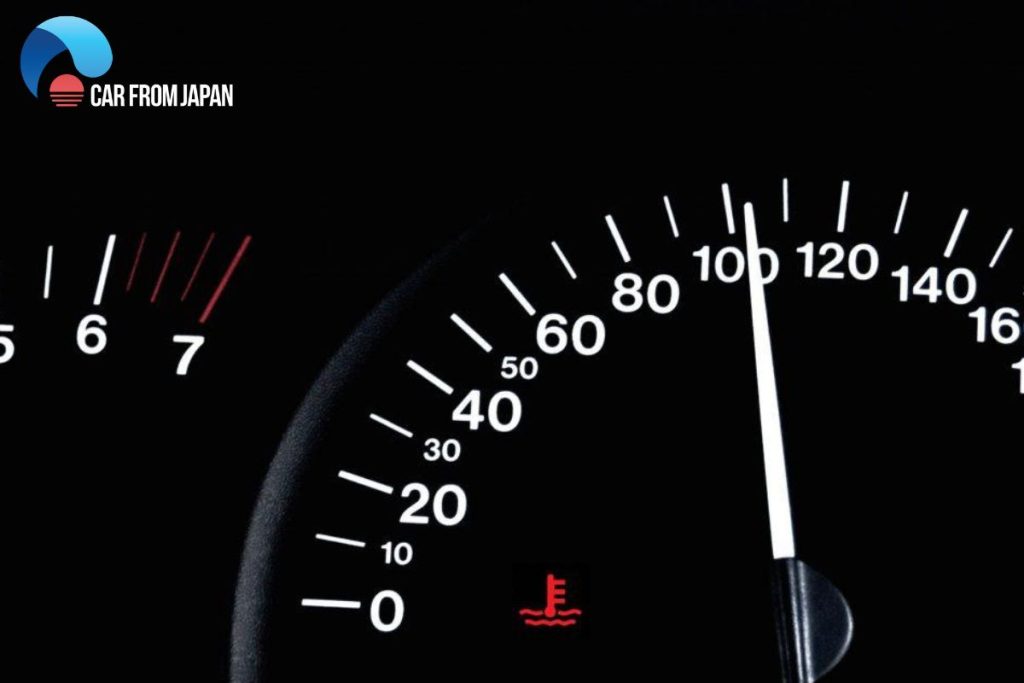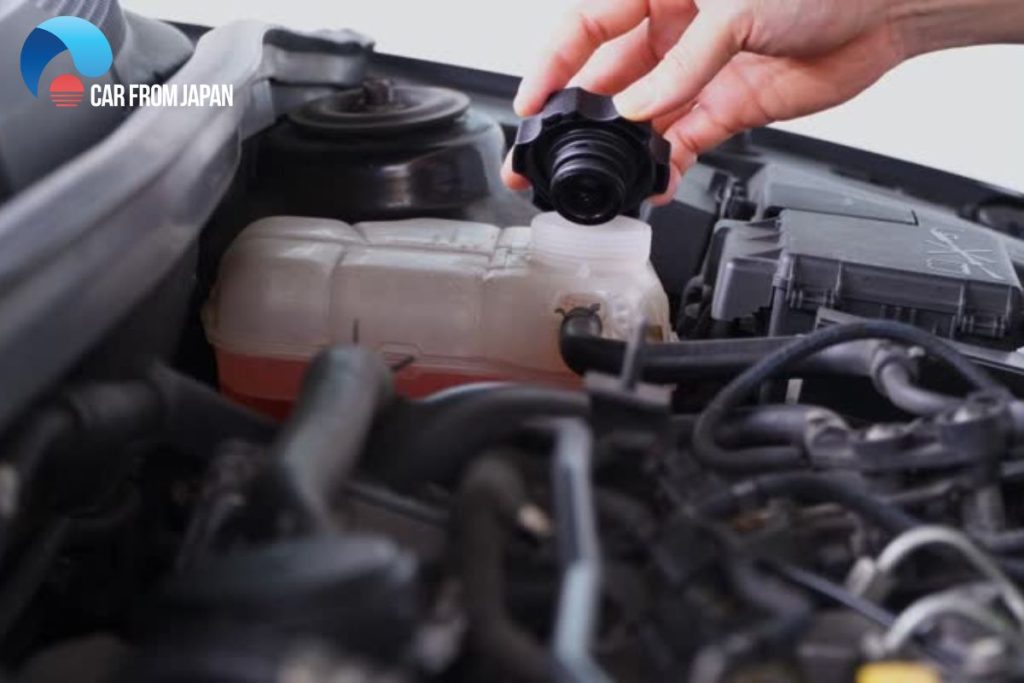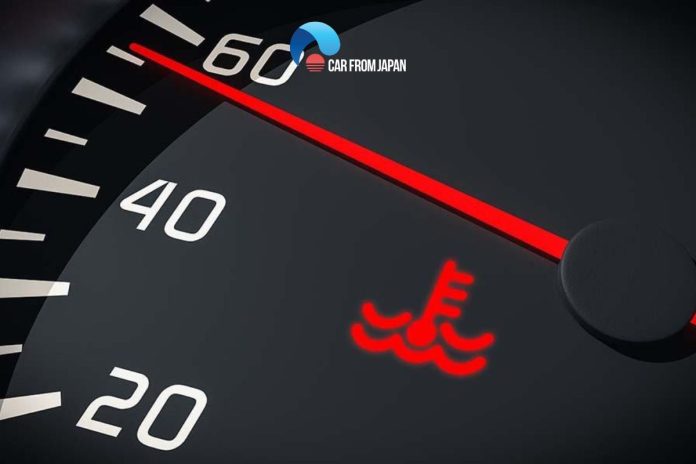Imagine that you’re driving on the highway, enjoying the ride, when suddenly, a warning light illuminates your dashboard – the red coolant temperature warning light.
This warning light is a crucial indicator of your engine’s health. Understanding its causes and solutions can save you from costly repairs and potential engine damage.
Contents
What The Coolant Temperature Warning Light Means?
The coolant temperature warning light (also known as the engine temperature warning light), often represented by a thermometer or temperature gauge symbol, is an important indicator on your dashboard.
It is designed to warn drivers of dangerously high engine coolant temperatures, which can lead to engine damage.
When the engine is started, the coolant warning light will illuminate for a few seconds to check the light bulb.
In case the coolant temperature warning light is still illuminated after starting the vehicle, it will signal that the vehicle is experiencing trouble in the system.
And the most common reasons for a glowing of this temperature light car are usually the temperature or the fluid level of the coolant. It signals that your engine’s coolant temperature is too high, potentially leading to overheating.
Coolant, a mixture of water and antifreeze, circulates through your engine, absorbing heat and preventing damage. When the light illuminates, it means this system is failing.
The car’s computer will often save the code in case of a problem, which is to get the tools through the scan and connect, this is an extremely useful tool in the process of identifying problems for the coolant temperature warning light.

Why Is The Temperature Warning Light On?
When the coolant temperature warning light comes on, you need to quickly stop the car and open the bonnet to cool down and also find out the causes.
The temperature warning light can be caused by overheating, lack of cooling water, or a cooling system that is having trouble. At this point, you need to park your car in a safe area with shade (if it’s summer) to open the bonnet:
Low coolant level
Insufficient coolant in the system hinders heat absorption, leading to overheating. Regularly check your coolant reservoir and top it off as needed.
Coolant leaks
Leaks in hoses, radiator, water pump, or head gasket allow coolant to escape, reducing the system’s capacity to cool the engine. Inspect for visible leaks and address them promptly.
Faulty thermostat
This valve regulates coolant flow. If stuck closed, coolant circulation is restricted, causing the engine to overheat.
Clogged radiator
Debris buildup in the radiator restricts airflow, hindering heat dissipation. Regularly clean or flush your radiator to ensure optimal cooling.
Overworking the engine
Continuous heavy loads, towing, or driving in extreme heat can strain the cooling system, potentially causing overheating.
Pay extra attention and follow up to find out the cause. There are many cases of heavy vehicles, that are too high, which can cause the vehicle to overheat, just let the car rest and operate again when the machine cools.
How To Fix The Coolant Temperature Warning?
Seeing that coolant temperature warning light illuminate on your dashboard is never a good sign. It means your engine is overheating, and ignoring it can lead to serious, expensive damage. Here’s what you should do:

- Pull over as soon as possible and shut the engine off. Wait for at least 30 minutes for the engine to cool down.
- Wear a thick glove or wrap the hand with a thick towel or a piece of rag and remove the radiator cap to check the coolant level. Never do this when the engine is still hot because the steam coming out of it can burn you.
Note: Do not rush to open the cap of the coolant tank because when the indicator light is on, the temperature is too high, causing the pressure of the fluid to be very high, if opened immediately, it will cause water to erupt and be severely burned. Instead, open the capo to cool the engine system, and then open the tank and check if there is no loss of coolant.
- If the fluid level is low, add plain water and drive to a nearby repair shop to check everything thoroughly. Remember that it’s just a temporary solution. A low level of coolant means there is a leak somewhere, which needs to be addressed quickly.
- On the other hand, if the car gets overheated despite no leakage or low coolant level, you should not drive it again before taking it to an auto servicing center.
What Happens When You Keep Driving with the Light on?
Driving with the coolant temperature warning light on means that you are driving with an overheated car. Severe damage can occur and you may end up with an engine failure.
The engine may start creating a knocking sound that is likely to ruin the head gasket, ring, and piston.
The heat will expand the metal parts to increase in size, creating a chance to cause extreme metal-to-metal friction. It will create a high level of abrasion and scrape and scratch the camshaft, pistons, valve, and other components badly.
A high level of thermal stress in the head and block is a common side effect of severe overheating. If your car has aluminum heads, the possibility of it cracking under such pressure is much higher.
Watch more:
FAQs
What does the coolant temperature warning light look like?
It often resembles a thermometer or a temperature gauge symbol. It may be red or amber and sometimes has the word “TEMP” or “HOT” next to it.
How long can you drive with coolant warning light?
Our answer is zero miles, ignoring the coolant warning signs can result in a vehicle that no longer functions. When you see the red light illuminate on the car dashboard, you should stop your car as soon as it is safe to do so and let the engine cool down for at least 30 minutes.
What does the blue coolant temperature light mean?
The blue light indicates that the engine coolant temperature is low, and the red one indicates that the engine coolant temperature is high and overheating.
When you turn on the car, the warning light illuminates for one to two minutes (until the engine is at optimal operative temperature) and then goes off automatically.
Conclusion
If you don’t want your car to suffer more permanent damage, never try to keep driving when the coolant temperature warning light comes on.
There are some models such as any Cadillac with a Northstar V8 engine that use some advanced measures for internal cooling, which prevent engine damage during overheating.
However, it will just give you some time to drive the vehicle to a service facility, not for continuous driving. If you are interested in our maintenance tips that have been provided. Let’s follow us for more daily updated articles to satisfy your demands.




What Should You Do When the Temperature Warning Light Comes on?
The warning light flashes for a second or two when the engine starts. If it stays on, there’s must be something wrong with the coolant.
What should you do when the oil warning light comes on
you should fill oil
Hello I have a Nissan March 2003 model FDKARCAK12EDA the temperature light came on red
I pulled car over let it cool down, the coolant had filled up the over flow bottle , so I poured back in radiator to get me home , I replaced radiator cap still gets hot ? Leo
Hello i have Polo VW 2008 model i always experience the temperature light when i start the car but hence the level of water is still right. ……i tried to change using Anti frezzer but still …..pls help
hi, I have vw polo 6N2 1.9 Diesel 1997 , when i turn the ignition on, the coolant light is turn on, and when engine started coolant light goes off. I checked cooolant leval, that’s ok .But every time I turned the key to ignition on the problem continues.but when running the engine the coolant light vent off . Please give me an Idea to fix this..thank you
My Ford figo car temperature light goes on while driving slowly in 1st and 2nd gear, after 3rd and 4th it will be cutoff,
Its like flickering,
I have serviced radiator, changed ECT sensor, Checked there is no leak also, There is no boiling of water too
But even i am facing the temperature light flickering
Note:
i have noticed while servicing radiator it seem solid coolant particles are con-dominated
Kindly Feedback for my query.